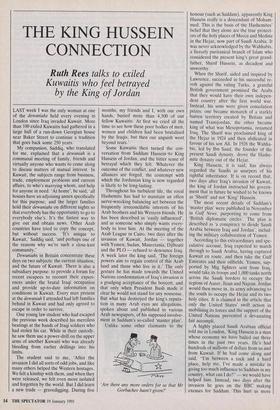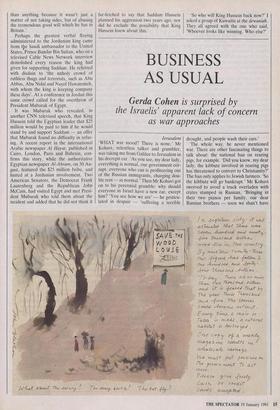THE KING HUSSEIN CONNECTION
Ruth Rees talks to exiled
Kuwaitis who feel betrayed by the King of Jordan
LAST week I was the only woman at one of the dewaniahs held every evening in London since Iraq invaded Kuwait. More than 100 exiled Kuwaitis had gathered in a large hall of a run-down Georgian house near Baker Street to continue a tradition that goes back some 250 years.
My companion, Saddiq, who translated for me, explained that a dewaniah is a communal meeting of family, friends and virtually anyone who wants to come along to discuss matters of mutual interest. In Kuwait, the subjects range from business, trade, employment problems and current affairs, to who's marrying whom, and help for anyone in need. 'At home', he said, 'all houses have an adjoining annex specifically for this purpose, and the larger families hold their dewaniahs on different nights so that everybody has the opportunity to go to everybody else's. It's the fastest way to give out and obtain news. Other Arab countries have tried to copy the concept, but without success. 'It's unique to Kuwait,' Saddiq said, 'and perhaps one of the reasons why we're such a close-knit community.'
Dewaniahs in Britain concentrate these days on two subjects: the current situation, and the future of Kuwait. There is also a subsidiary purpose: to provide a forum for recent escapees to recount their experi- ences under the brutal Iraqi occupation and provide up-to-date information on conditions in Kuwait. Every man present at the dewaniah I attended had left families behind in Kuwait and had only agreed to escape in order to survive.
One young law student who had escaped the previous week described his merciless beatings at the hands of Iraqi soldiers who had stolen his car. While in their custody, he saw them use a power-drill on the upper arms of another Kuwaiti who was already bleeding from earlier drillings into his limbs.
The student said to me, 'After the invasion I did all sorts of odd jobs, and like many others helped the Western hostages. We felt a kinship with them, and when they were released, we felt even more isolated and forgotten by the world. But I did learn a new trade — gravedigging. During five months, my friends and I, with our own hands, buried more than 4,500 of our fellow Kuwaitis. At first we cried all the time to see how these poor bodies of men, women and children had been brutalised by the Iraqis, but then our anguish went beyond tears.'
Some Kuwaitis then turned the con- versation from Saddam Hussein •to King Hussein of Jordan, and the bitter sense of betrayal which they felt. Whatever the outcome of the conflict, and whatever new alliances are forged, the contempt with which the Jordanian king is now regarded is likely to be long-lasting.
Throughout his turbulent life, the royal Hashemite has had to maintain an often nerve-wrecking balancing act between the frequently irreconcilable interests of his Arab brothers and his Western friends. He has been described as 'easily influenced', and as someone who simply wants every- body to love him. At the meeting of the Arab League in Cairo, two days after the invasion of Kuwait, Jordan — together with Yemen, Sudan, Mauretania, Djibouti and the PLO — refused to denounce Iraq. A week later the king said, 'The foreign powers aim to regain control of this Arab land and those who live in it.' The only gesture he has made towards the United Nations condemnation of Iraq's invasion is a grudging acceptance of the boycott, and that only when President Bush made it clear he would not stand for any nonsense. But what has destroyed the king's reputa- tion in many Arab eyes are allegations, spoken about and published in various Arab newspapers, of his supposed involve- ment in Saddam's so-called 'master plan'.
Unlike some other claimants to the 'Are there any more orders for us that Mr Gorbachev hasn't given?' honour (such as Saddam), apparently King Hussein really is a descendant of Moham- med. This is the basis of the Hashemites' belief that they alone are the true protect- ors of the holy places of Mecca and Medina in the Hejaz, now part of Saudi Arabia. It was never acknowledged by the Wahhabis, a fiercely puritanical branch of Islam who considered the present king's great grand- father, Sharif Hussein, as decadent and unworthy.
When the Sharif, aided and inspired by Lawrence, succeeded in his successful re- volt against the ruling Turks, a grateful British government promised the Arabs that they would have their own indepen- dent country after the first world war. Instead, his sons were given consolation prizes: one became monarch of a starkly barren territory created by Britain and named Transjordan, the other became king of what was Mesopotamia, renamed Iraq. The Sharif was proclaimed king of the Hejaz in 1924 and then abdicated in favour of his son Ali. In 1926 the Wahha- bis, led by Ibn Saud, the founder of the present Saudi dynasty, drove the Hashe- mite dynasty out of the Hejaz.
King Hussein, it is said, has always regarded the Saudis as usurpers of his rightful inheritance. It is on record that, two days after Iraq's invasion of Kuwait, the king of Jordan instructed his govern- ment that in future he wished to be known as `Sharif and not 'King' Hussein.
The most recent details of Saddam's `master plan' were published in November in Gulf News, purporting to come from `British diplomatic circles'. The plan is described as 'a conspiracy to divide Saudi Arabia between Iraq and Jordan', includ- ing the military collaboration of Yemen.
According to this extraordinary and spe- culative account, Iraq expected to march through to Saudi Arabia, having captured Kuwait en route, and then take the Gulf Emirates and their oilfields. Yemen, sup- ported by Mig fighters sent from Iraq, would take its troops and 1,000 tanks north across the Saudi borders to occupy the regions of Aseer, Jizan and Najran. Jordan would then move in, its army advancing to the south to occupy the Hejaz and its two holy cities. It is claimed in the article that only the United States' swift action in mobilising its forces and the support of the United Nations prevented a devastating fait accompli.
A highly placed Saudi Arabian official told me in London, 'King Hussein is a man whose economy we have bailed out three times in the past two years. He's had hundreds of millions of dollars from us and from Kuwait. If he had come along and said, "I'm between a rock and a hard place, help me, I've made a mistake in giving too much influence to Saddam in my country, what can I do?" — we would have helped him. Instead, two days after the invasion he goes on the BBC making excuses for Saddam. This hurt us more than anything because it wasn't just a matter of not taking sides, but of abusing the tremendous good will which he has in Britain.'
Perhaps the greatest verbal flaying administered to the Jordanian king came from tile Saudi ambassador to the United States, Prince Bandar Bin Sultan, who on a televised Cable News Network interview demolished every reason the king had given for supporting Saddam. He referred with disdain to 'the unholy crowd of ruthless thugs and terrorists, such as Abu Abbas, Abu Nidal and Nayef Hawatemeh, with whom the king is keeping company these days'. At a conference in Jordan this same crowd called for the overthrow of President Mubarak of Egypt.
It was Mubarak who revealed, in another CNN televised speech, that King Hussein told the Egyptian leader that $25 million would be paid to him if he would stand by and support Saddam — an offer that Mubarak found no difficulty in refus- ing. A recent report in the international Arabic newspaper Al Hayat, published in Cairo, London, Paris and Bahrain, con- firms this story, while the authoritative Egyptian newspaper Al-Ahram, on 30 Au- gust, featured the $25 million bribe, and hinted at a Jordanian involvement. Two American Senators, the Democrat Frank Lautenberg and the Republican John McCain, had visited Egypt and met Presi- dent Mubarak who told them about the incident and added that he did not think it
far-fetched to say that Saddam Hussein planned his aggression two years ago, nor did he exclude the possibility that King Hussein knew about this.
`So who will King Hussein back now?' I asked a group of Kuwaitis at the dewaniah. They all agreed with the one who said, `Whoever looks like winning. Who else?'



















































 Previous page
Previous page